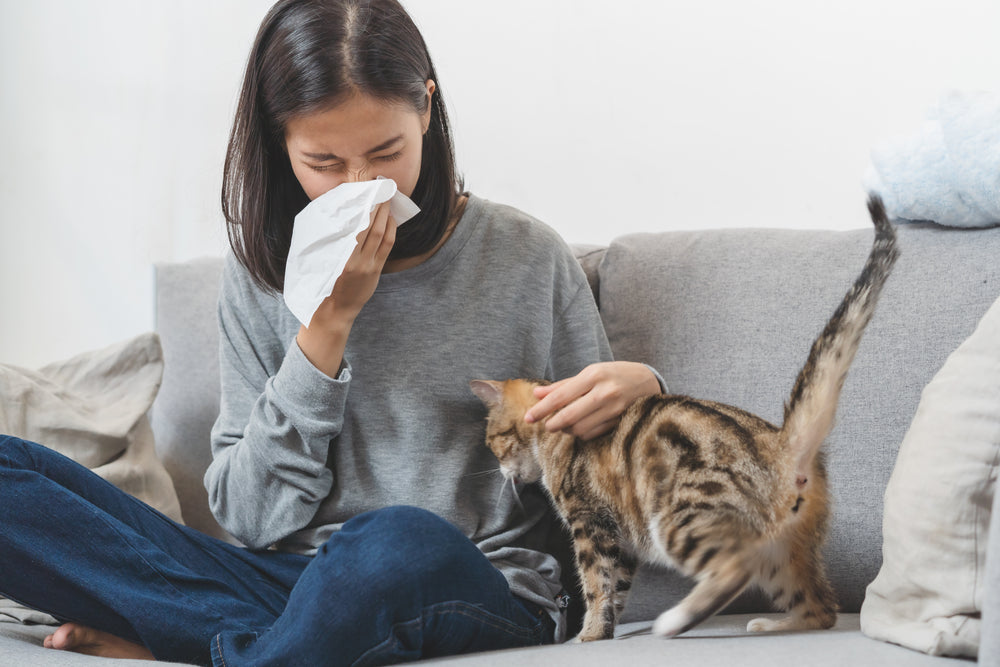When you think about pet allergies, dogs and cats probably come first to mind. However, many rodents and birds can also be the culprit of pesky allergy symptoms. In fact, millions of Americans live with pets in their homes despite being allergic to them.
Understanding which pets produce allergy symptoms and how allergens spread will help determine if you are experiencing pet allergies. Whether your pet has fur or feathers, an air purifier can help clear your indoor air from pet dander, fur, and feathers.
Fight your pet allergies–shop Air Oasis iAdaptAir™ air purifiers.
What Are Pet Allergies?
Like all allergens, pet allergies specifically cause your immune system to react to foreign substances in animals that are usually harmless, similar to how your body would respond to a virus or bacteria. This reaction triggers pet allergy symptoms in humans.
General allergy symptoms and more serious allergic reactions to pets are caused by particular proteins located in the animal’s skin cells, urine, and saliva. Most pet allergies are caused by dead flakes of skin that animals shed in peoples’ homes called pet dander.
Any animal with fur, short or long, can be a cause for pet allergy symptoms in humans. Most commonly known, cats and dogs are, in fact, the worst culprits of pet allergy symptoms.
Common pet allergy symptoms are similar to hay fever, including a runny nose, sneezing, wheezing, coughing, eye irritation, and signs of asthma. In extreme cases, pet allergies can cause difficulty breathing.
Animal allergens typically land on the membranes that line the eyes and nose, but you can also breathe pet allergens into your respiratory tract.
Types of Pets That Cause Allergies
From fur to feathers and every length of coat in between, several animals can cause symptoms of pet allergies. However, 10 to 20% of the world’s population is affected by dog and cat allergies, making these animals the most common cause of pet allergies.
Rabbit Allergies
While dogs and cats are the most common cause of pet allergies, rabbits are growing in popularity as a household pet and cause of pet allergy symptoms as well.
Surprisingly, rabbits' primary source of allergens is in their saliva, not their fur. Although rabbit allergens can also be found in urine, the saliva of a rabbit contains the highest concentration of allergens.
Rabbits often eat a diet of hay and grass, which can also be an allergy trigger for owners of pet rabbits.
Rodent Allergies
Many people think that if their pet doesn’t have a fluffy coat like a Golden Retriever, they cannot experience pet allergies. In truth, rodent pets are a common cause of pet allergies. This can include rats, mice, hamsters, gerbils, and guinea pigs. The primary source of rodent allergens is dander, skin cells that shed from the pet and become airborne or land on surfaces in your home.
While it’s most common that symptoms of rodent pet allergies come from direct contact with the animal, allergens can be carried in the air.
Bird Allergies
Individuals with bird feather allergies experience pet allergy symptoms such as hay fever and asthma-like reactions. Parrots and parakeets are two of the most common culprits of pet bird allergies.
Like pet dander from dogs and cats, feather dander and sheath dust becomes airborne each time a bird preens itself, ruffles its feathers, or shakes its body. The dust and dander released by these movements cause allergic reactions in some individuals.
Dog & Cat Allergies
Cat allergens are specifically found in cat saliva. Cat saliva sticks to a cat's fur when they frequently lick themselves. They are also released by glands in the skin and shed as dander or secreted in the urine of male cats. Cat allergies easily remain airborne due to the buoyancy of the allergens.
Dog allergens are found in urine, blood, saliva, and also dander. All breeds of dogs can trigger allergies, though allergen levels do differ among different breeds. Even hairless dogs can produce symptoms of pet allergies.
Horse Allergies
With short, shedding fur similar to that of many breeds of dogs and cats, people who experience horse allergies are specifically allergic to a horse’s serum albumin. Similar to pet dander, serum albumin is a protein found in horses’ blood that is also found in their skin cells. Concentrations of horse dander can also be found in their saliva. Like other animals, humans coming in contact with a horse’s dander causes pet allergy symptoms such as sneezing and asthma. It’s common for dog and cat allergy sufferers to also suffer from horse allergies. If you have a known allergy to dogs and cats, you can also expect a higher likelihood of experiencing horse allergies.
Air Purifiers for Pet Allergies
If you suffer from symptoms of pet allergies, the best treatment is to reduce exposure to the pet. However, it’s not always that easy. 66% of U.S. households have pets, and they are often more than that–they are a member of the family.
If removal of the pet from your home is not an option, there are preventative measures you can take to help reduce symptoms of pet allergies. Consider keeping your pet outdoors year-round if you live in a warm climate or the warmer months of the year. Keep pets off of bedding and upholstered furniture that you frequently sit on.
Finally, a HEPA-enabled air purifier will help cleanse your indoor air from that pesky pet dander that produces your allergy symptoms. Shop the Air Oasis iAdaptAir to help reduce symptoms of pet allergies today.



